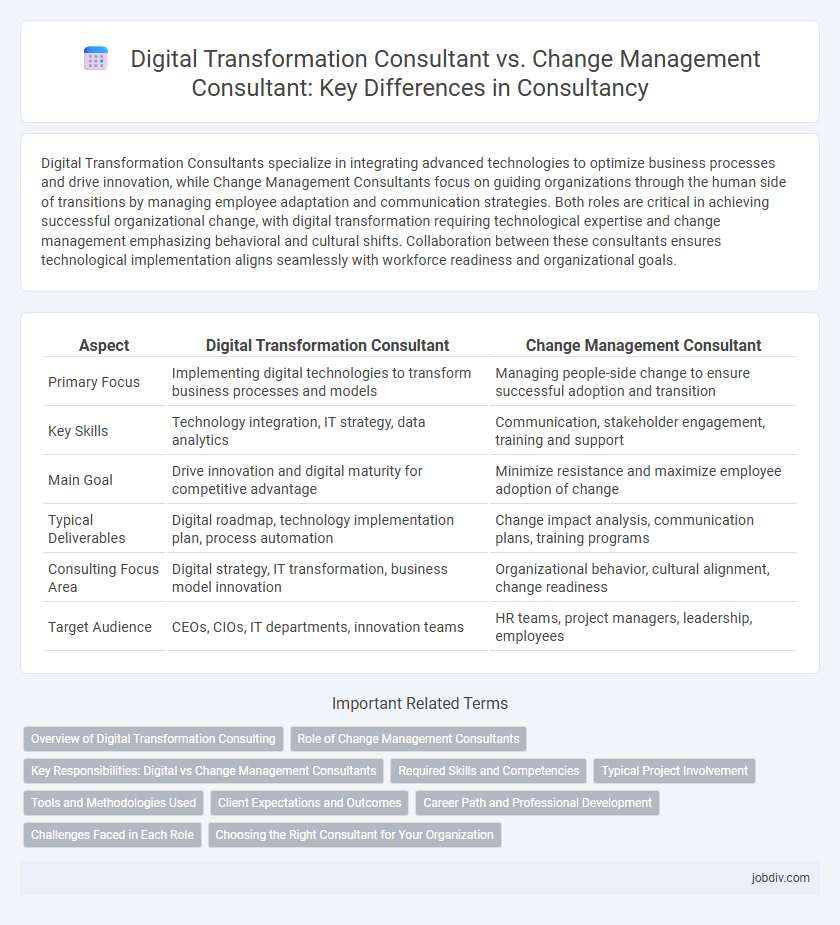Digital Transformation Consultants specialize in integrating advanced technologies to optimize business processes and drive innovation, while Change Management Consultants focus on guiding organizations through the human side of transitions by managing employee adaptation and communication strategies. Both roles are critical in achieving successful organizational change, with digital transformation requiring technological expertise and change management emphasizing behavioral and cultural shifts. Collaboration between these consultants ensures technological implementation aligns seamlessly with workforce readiness and organizational goals.
Table of Comparison
| Aspect | Digital Transformation Consultant | Change Management Consultant |
|---|---|---|
| Primary Focus | Implementing digital technologies to transform business processes and models | Managing people-side change to ensure successful adoption and transition |
| Key Skills | Technology integration, IT strategy, data analytics | Communication, stakeholder engagement, training and support |
| Main Goal | Drive innovation and digital maturity for competitive advantage | Minimize resistance and maximize employee adoption of change |
| Typical Deliverables | Digital roadmap, technology implementation plan, process automation | Change impact analysis, communication plans, training programs |
| Consulting Focus Area | Digital strategy, IT transformation, business model innovation | Organizational behavior, cultural alignment, change readiness |
| Target Audience | CEOs, CIOs, IT departments, innovation teams | HR teams, project managers, leadership, employees |
Overview of Digital Transformation Consulting
Digital Transformation Consultants specialize in integrating advanced technologies such as AI, IoT, and cloud computing to optimize business processes and drive innovation. Their role involves aligning digital strategies with organizational goals to enhance customer experience and operational efficiency. Unlike Change Management Consultants who focus on people-centric transitions, Digital Transformation Consultants concentrate on technology adoption and digital ecosystem development.
Role of Change Management Consultants
Change Management Consultants specialize in guiding organizations through the human and cultural aspects of digital transformation, ensuring employee adoption and minimizing resistance to new technologies. They develop tailored communication strategies, training programs, and stakeholder engagement plans to align workforce behavior with strategic objectives. Their expertise bridges the gap between technology implementation and organizational readiness, driving sustainable change and business value.
Key Responsibilities: Digital vs Change Management Consultants
Digital Transformation Consultants develop and implement technology-driven strategies to optimize business processes, enhance digital capabilities, and enable innovation across organizations. Change Management Consultants focus on guiding employees and stakeholders through organizational transitions by designing communication plans, training programs, and resistance management strategies to ensure smooth adoption of new systems or processes. Digital roles emphasize technical integration and process automation, while change management roles prioritize human factors and behavioral adaptation for successful transformation.
Required Skills and Competencies
Digital Transformation Consultants require expertise in emerging technologies, data analytics, and strategic IT integration to drive innovation and business model evolution. Change Management Consultants must excel in stakeholder engagement, communication, and behavioral psychology to effectively manage resistance and foster employee adoption. Both roles demand strong leadership, problem-solving abilities, and a deep understanding of organizational dynamics to deliver successful business transformations.
Typical Project Involvement
A Digital Transformation Consultant typically leads projects involving the integration of advanced technologies such as cloud computing, artificial intelligence, and big data analytics to optimize business processes and enhance customer experiences. In contrast, a Change Management Consultant focuses on managing the human side of transformation, including stakeholder engagement, communication strategies, and training programs to ensure smooth adoption of new systems. Both roles collaborate closely during transformation initiatives, with digital consultants driving technical execution and change consultants facilitating organizational readiness.
Tools and Methodologies Used
Digital Transformation Consultants utilize advanced technologies such as AI, cloud computing, and data analytics platforms alongside Agile and DevOps methodologies to streamline business processes and enhance digital capabilities. Change Management Consultants focus on stakeholder engagement frameworks, ADKAR and Prosci models, and communication tools to effectively manage organizational transitions and employee adoption. Both roles leverage project management software like Jira and Microsoft Project to ensure alignment and track progress throughout transformation initiatives.
Client Expectations and Outcomes
Digital Transformation Consultants focus on leveraging technology to optimize business processes, aiming to enhance efficiency, innovation, and competitive advantage by integrating digital tools tailored to client needs. Change Management Consultants prioritize guiding organizations through the human and cultural aspects of transformation, ensuring employee adoption, minimizing resistance, and sustaining long-term change for client success. Clients expect measurable improvements in operational performance from Digital Transformation, while Change Management delivers smooth transitions with high stakeholder engagement and minimized disruption.
Career Path and Professional Development
Digital Transformation Consultants focus on leveraging technology to optimize business processes and IT infrastructure, requiring skills in data analytics, cloud computing, and emerging technologies, making career paths often lead to roles like Chief Digital Officer or IT Strategy Manager. Change Management Consultants specialize in guiding organizational change through stakeholder engagement, communication strategies, and training programs, advancing towards roles such as Organizational Development Director or Senior Change Manager. Both career paths demand continuous professional development through certifications like Prosci for change management and Digital Transformation Professional credentials for technology-driven expertise.
Challenges Faced in Each Role
Digital Transformation Consultants often face challenges related to integrating advanced technologies with legacy systems, aligning digital strategies with business goals, and managing stakeholder expectations amid rapid technological shifts. Change Management Consultants encounter difficulties in overcoming employee resistance, fostering cultural adaptation, and ensuring consistent communication during organizational change initiatives. Both roles require distinct expertise in handling technology adoption and human factors to drive successful transformation.
Choosing the Right Consultant for Your Organization
Choosing the right consultant between a Digital Transformation Consultant and a Change Management Consultant hinges on your organization's specific needs: Digital Transformation Consultants specialize in integrating cutting-edge technologies and streamlining operations, while Change Management Consultants focus on guiding employees through cultural and procedural shifts. Evaluating your organization's readiness for technological adoption versus its capacity to embrace behavioral change ensures a targeted approach that maximizes impact. Prioritizing expertise areas like digital strategy, stakeholder engagement, and training programs enhances alignment with business objectives and accelerates sustainable growth.
Digital Transformation Consultant vs Change Management Consultant Infographic

 jobdiv.com
jobdiv.com